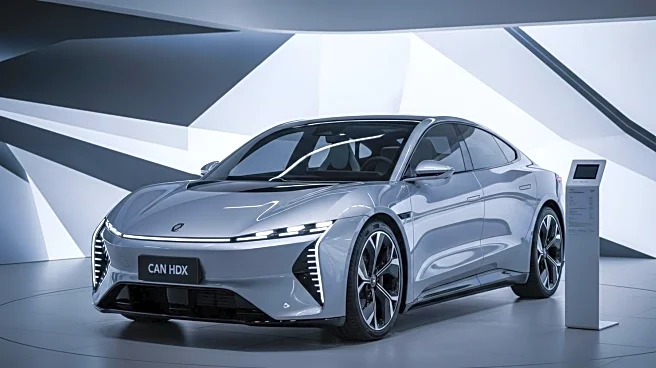What is the story about?
What's Happening?
Chinese electric vehicle manufacturer BYD Co has announced that it expects exports to constitute approximately 20% of its global sales in 2025. This projection is supported by the launch of new models, according to a report by the South China Morning Post. BYD anticipates delivering between 800,000 to 1 million vehicles outside mainland China, out of a total projected sales of 4.6 million units for the year. This marks a significant increase from 2024, when sales outside the mainland accounted for less than 10% of BYD's total deliveries of 4.26 million vehicles. The company's general manager of branding and public relations, Li Yunfei, highlighted the role of BYD's fleet of car-carrier ships in facilitating the export surge.
Why It's Important?
The increase in export sales is a strategic move for BYD as it faces its slowest annual growth in five years. The company has reduced its 2025 sales target by up to 16%, indicating potential challenges in maintaining its previous record-setting expansion. By focusing on international markets, BYD aims to diversify its revenue streams and mitigate risks associated with domestic market fluctuations. This shift could have broader implications for the global electric vehicle market, potentially increasing competition and influencing pricing strategies among other manufacturers.
What's Next?
BYD's focus on expanding its international presence may lead to increased investments in overseas marketing and distribution networks. The company might also explore partnerships or collaborations with local firms in target markets to enhance its competitiveness. As BYD continues to launch new models, it will likely monitor consumer preferences and adjust its offerings to meet regional demands. The success of these initiatives could influence other Chinese EV manufacturers to adopt similar strategies.
Beyond the Headlines
The expansion of BYD's export sales could have environmental implications, as increased production and transportation of vehicles may contribute to carbon emissions. However, the promotion of electric vehicles globally aligns with efforts to reduce reliance on fossil fuels and decrease overall emissions. Additionally, BYD's strategy may prompt discussions on trade policies and regulations affecting the automotive industry, particularly in regions with stringent import controls.

















